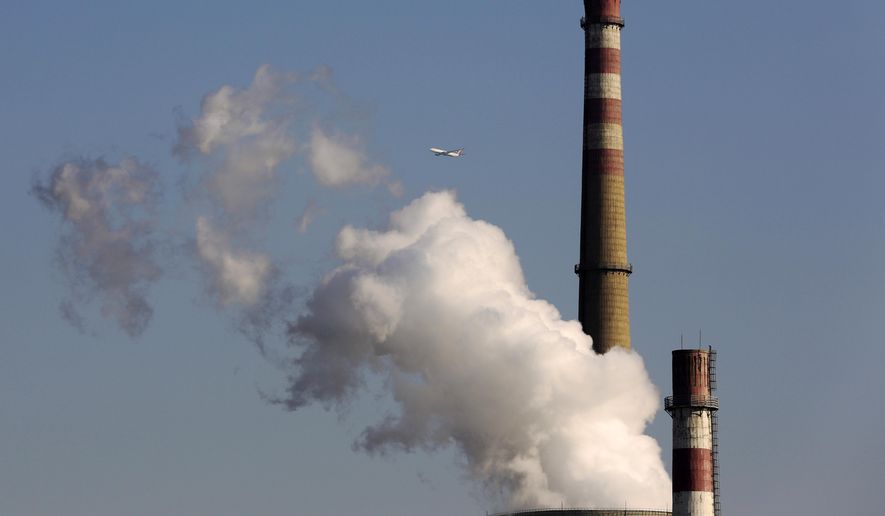President Obama’s new national-security strategy ranks combating climate change as a priority alongside more traditional threats such as terrorism, biological emergencies and nuclear weapons in the hands of rogue states.
The White House released an outline Friday of Mr. Obama’s updated national-security strategy, the administration’s first revision in five years. Along with confronting terrorist groups such as the Islamic State and working to reverse automatic budget cuts for national defense, the administration cited climate change as a top priority.
President Obama said the multiple national-security challenges around the globe will require “strategic patience.”
“As powerful as we are and will remain, our resources and influence are not infinite,” Mr. Obama said in a letter to Congress. “We must recognize that a smart national security strategy does not rely solely on military power. Indeed, in the long-term, our efforts to work with other countries to counter the ideology and root causes of violent extremism will be more important than our capacity to remove terrorists from the battlefield. The challenges we face require strategic patience and persistence.”
Sen. Lindsey Graham, South Carolina Republican, criticized that view.
“I doubt [the Islamic State], the Iranian mullahs, or [Russian President] Vladmir Putin will be intimidated by President Obama’s strategy of ’strategic patience,’” Mr. Graham said. ” From their point of view, the more ’patience’ President Obama practices, the stronger they become. The Obama Doctrine, or “strategic patience,” has led to a world in chaos.”
Mr. Graham added, “We now confront a growing threat from radical Islamists intent on striking the American homeland as well as wreaking havoc on the Middle East, Iranian mullahs intent on obtaining nuclear weapons capability, strengthened dictatorships in Russia and Cuba, and the poorest relationship with Israel in decades. The consequences of Obama’s ’strategic patience’ are an America that is less secure and at greater risk.”
The president is committed to “confronting the urgent crisis of climate change, including through national emissions reductions, international diplomacy, and our commitment to the Green Climate Fund,” the White House said.
A clean-coal advocacy group immediately blasted the administration’s plan.
“The mere suggestion that climate change is akin to public health crises, dangerous radical groups and a host of other immediate — and legitimate — security threats is absurd,” said Laura Sheehan, an executive at the American Coalition for Clean Coal Electricity. “President Obama’s climate change regulations are, in fact, the real threat to our national security, putting the lives of families at risk, hamstringing our economy and undermining domestic energy production.”
White House National Security Adviser Susan E. Rice said 2015 “is a whole new ballgame” for national security and that Mr. Obama intends to “stake out a much larger role for America in shaping the world.”
“President Obama has two years left in his term, and two years is plenty of time,” Ms. Rice said at the Brookings Institution. “President Obama is going to leave everything on the field. We are committed to seizing the future that lies beyond the crisis of the day.”
Five years ago, Mr. Obama’s strategy called for a cooperative “reset” in relations with Russia. Given the Russian-backed war in Ukraine, Ms. Rice acknowledged that the president now is taking a different approach to Moscow.
“Now we have to deal with the realities we face,” she said. “We will push back and impose costs for Russia’s aggression.”
Vice President Joseph R. Biden, meeting Friday with European Union leaders in Brussels, acknowledged that the U.S. and its allies haven’t stopped Russia’s proxy invasion in eastern Ukraine with the pressure of economic sanctions.
“Ukraine is fighting for their very survival right now,” Mr. Biden said. “This is a moment where the United States and Europe must stand together — stand firm. Russia cannot be allowed to redraw the map of Europe. Because that’s exactly what they are doing.”
Ms. Rice also addressed the U.S. coalition fighting the Islamic State, also known as ISIL and ISIS, saying patience is required.
“Fighting terrorism is a long-term struggle. There will be setbacks,” she said. “ISIL should know that their barbarism only fortifies the world’s collective resolve.”
She said the administration has released about half of the terrorism detainees from the Guantanamo Bay detention center, and added, “We mean to keep going until we finish the job.”
The other priorities in the plan are:
• Maintaining a national defense that is “the best trained, equipped, and led force in the world.”
• Ending sequestration budget cuts.
• Reinforcing homeland security “to keep the American people safe from terrorist attacks and natural hazards while strengthening our national resilience.”
• Keeping the pressure on al Qaeda and other terrorist groups while “transitioning to a sustainable global security posture that combines our decisive capabilities with local partners.”
• Pursuing “a world without nuclear weapons and ensuring nuclear materials do not fall into the hands of irresponsible states and violent non-state actors.”
• Developing a global capacity “to prevent, detect, and rapidly respond to biological threats” such as Ebola.
Departing Defense Secretary Chuck Hagel said the strategy “makes clear [that] a strong military is the bedrock of our national security.”
“The Department of Defense stands ready to help execute the president’s strategy,” Mr. Hagel said.
Secretary of State John F. Kerry called the plan “a pragmatic, clear-eyed assessment of both the challenges we face and the full arsenal of our power to confront them through moral, diplomatic, economic, development, and military tools.”
“It’s a strategy to promote our values in a world where no ocean, no fence, and no firewall can shield us from the reality of threats across the globe,” Mr. Kerry said.
• Dave Boyer can be reached at dboyer@washingtontimes.com.




Please read our comment policy before commenting.